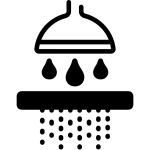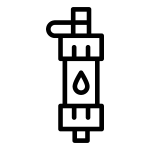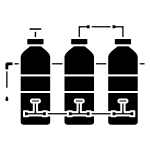Access to clean, safe, and healthy water is crucial—especially when your home relies on well water. Unlike municipal water systems, which are regulated and treated before distribution, well water is untreated, meaning it can contain everything from sediment and sand to bacteria, iron, and other contaminants. This is why filtration is essential, and one of the most important components of any well water filtration system is the micron filter.
If you’re wondering what micron filter is best for well water, you’re in the right place. In this complete guide from Cuoll, your go-to source for water filters, purifiers, bathtubs, and home improvement products, we’ll walk you through everything you need to know—what micron ratings mean, how to choose the best one, and which filter works best depending on your specific water quality.
Table of Contents
- What Is a Micron Filter?
- Understanding Micron Ratings
- Why Micron Filters Matter for Well Water
- Common Contaminants in Well Water
- Choosing the Best Micron Filter for Well Water
- Recommended Micron Filters Based on Contaminants
- Best Practices for Using Micron Filters
- Other Essential Filtration Steps for Well Water
- Cuoll’s Top Micron Filter Recommendations
- Final Thoughts
What Is a Micron Filter?
A micron filter is a type of mechanical filter that removes particles from water based on their size. The term “micron” refers to the size of the holes in the filter that trap particles—1 micron equals one-millionth of a meter.
Micron filters are commonly used in whole house filtration systems, especially for well water, because they can catch:
- Sediment
- Silt
- Sand
- Rust
- Other particles that are visible and invisible to the naked eye
Understanding Micron Ratings
The micron rating of a filter tells you the smallest particle size it can remove:
- 50 micron – Removes large particles like visible sand or grit
- 25 micron – Captures medium sediment and fine sand
- 10 micron – Removes finer particles like silt and some bacteria
- 5 micron – One of the most common choices for general-purpose filtration
- 1 micron – Targets extremely fine particles, including some bacteria and cysts
- 0.5 micron – Effective against cryptosporidium, giardia, and some microbes
There are two types of micron ratings:
- Nominal Micron Rating – Removes about 85% of the particles at the specified size
- Absolute Micron Rating – Removes 99.9% of the particles at the specified size
💡 Tip from Cuoll: For well water, absolute-rated filters are often preferred for drinking water safety.
Why Micron Filters Matter for Well Water
Unlike city water, well water isn’t pre-treated, meaning it can carry:
- Organic matter
- Inorganic sediment
- Iron
- Bacteria
- Protozoa
- Pesticides
A micron filter is your first line of defense. It:
- Protects your plumbing and appliances
- Prevents clogging in water softeners and UV systems
- Enhances the taste and odor of your water
- Makes your entire filtration system more effective
Common Contaminants in Well Water
Before choosing a micron filter, it’s crucial to test your well water. Common well water contaminants include:
| Contaminant | Health/Plumbing Risks | Micron Size |
|---|---|---|
| Sand & Grit | Pipe damage, sediment buildup | 50–100 microns |
| Silt & Clay | Cloudy water, taste issues | 10–25 microns |
| Rust | Staining, metallic taste | 5–50 microns |
| Iron | Staining, bacteria growth | 1–10 microns |
| Bacteria | Health hazard | <1 micron |
| Cysts (Giardia, Crypto) | Health hazard | 0.5–1 micron |
Choosing the Best Micron Filter for Well Water
So, what micron filter is best for well water?
The answer depends on your specific water quality, but here are general guidelines:
- For heavy sediment (sand, grit): Use a 50-micron filter as a pre-filter
- For general use and rust removal: Go for a 5-micron filter
- For drinking water or biological contaminants: Use a 1-micron or 0.5-micron absolute filter
For most households with average well water: ✅ Start with a 5-micron filter, then test and adjust.
Recommended Micron Filters Based on Contaminants
Here’s a quick reference for choosing the right filter:
| Water Issue | Recommended Micron Rating | Filter Type |
|---|---|---|
| Cloudy Water | 10–25 micron | Spun polypropylene |
| Visible Sand/Grit | 50–100 micron | Stainless steel mesh |
| Rusty Water | 5–10 micron | Pleated polyester |
| Iron Bacteria | 1 micron | Carbon block or ceramic |
| Cysts and Microbes | 0.5–1 micron (absolute) | Ultrafiltration or ceramic |
Best Practices for Using Micron Filters
To get the best results:
- Test your well water annually
- Use a sediment pre-filter before carbon or softening units
- Replace filters regularly (typically every 3–6 months)
- Monitor pressure levels—a drop means it’s time to replace
- Combine with other systems like UV purifiers, softeners, or reverse osmosis
Other Essential Filtration Steps for Well Water
Micron filters are essential, but they’re only one part of a complete well water treatment system. Depending on your water test results, consider these additional steps:
- Carbon Filters – Remove chlorine, VOCs, odors
- Iron Filters – Oxidize and remove ferrous/ferric iron
- Water Softeners – Eliminate hardness (calcium, magnesium)
- UV Purifiers – Kill bacteria and viruses
- Reverse Osmosis – For the highest level of purification
💡 Layered filtration is the best approach for comprehensive safety and taste.
Cuoll’s Top Micron Filter Recommendations
At Cuoll, we offer a curated selection of high-quality water filtration products tailored to well water users.
1. Cuoll 5 Micron Sediment Filter
- Type: Polypropylene
- Best for: General sediment, rust, silt
- Use: Whole house filtration
- Lifespan: Up to 6 months
2. Cuoll 50 Micron Stainless Steel Mesh Filter
- Type: Reusable pre-filter
- Best for: Heavy sand and large particles
- Use: Installed before softeners/RO systems
3. Cuoll 1 Micron Carbon Block Filter
- Type: Carbon block
- Best for: Fine sediment, taste & odor, cysts
- Use: Drinking water systems
4. Cuoll 0.5 Micron Ceramic Filter
- Type: Ceramic with silver lining
- Best for: Giardia, Cryptosporidium, bacteria
- Use: Final stage filtration
All our products are tested, certified, and designed for long-term durability.
🛒 Shop our collection at Cuoll.com to find the perfect match for your well water system.
Final Thoughts
So, what micron filter is best for well water? The answer lies in your water quality, usage needs, and whether you’re filtering for sediment, bacteria, or both. A 5-micron filter is an excellent all-around choice for most households, but homes dealing with fine iron, cysts, or bacteria should go down to 1 micron or 0.5 micron absolute filters.
At Cuoll, we help you make the right choice. With our selection of high-quality water filters and purifiers, you can enjoy clean, safe, and great-tasting water—right from your well.
FAQs
1. Is a lower micron filter always better?
Not necessarily. While lower micron filters catch smaller particles, they can clog faster. Choose based on your specific water needs.
2. Can I use more than one filter?
Yes! A layered approach—like a 50-micron pre-filter followed by a 5-micron or 1-micron filter—is ideal for well water systems.
3. How often should I replace my micron filter?
Most should be replaced every 3 to 6 months, but always follow manufacturer recommendations.
4. Do micron filters remove bacteria?
Only filters rated 1 micron or smaller (especially absolute-rated) can effectively reduce bacteria or cysts.








